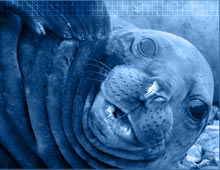
|
 |
 |

- Science and Language Arts for grades
6-8
The purpose of this activity is to learn about the giant petrel and the problems this bird faces.
1. Share the photographs of giant petrels with students.
2. Ask students to read Dan Grossman's January 14th journal entry and David Helvarg's article "Elegant Scavengers: Giant Petrels are a Bellwether Species for the Threatened Antarctic Peninsula" from the Environmental Magazine Web site at www.emagazine.com/november-december_1999/1199curr_scavengers.html
Teacher Note: You may choose to print this article and the journal entry ahead of time.
3. Discuss the following questions with your students:
- What do petrels eat?
- Where do they live?
- What unique defense mechanism do petrels have?
- How big was the bird Donna Patterson picked up?
- How does Donna Patterson track the petrels?
- How is the fishing industry affecting the petrel population?
- How is global warming affecting the petrel population?
- Do you think it is important to conduct petrel research? Explain.
- How many miles an hour can a petrel fly under the right conditions?
Use the information from the "Elegant Scavengers" article to solve this problem.
4. Ask students to respond to these questions in the Antarctic Learning Log:
- Do you think it is important to protect the petrels? Explain.
- What could we do to protect the petrels?
5. Share Donna Patterson's quote from David Helvarg's "Elegant Scavengers" article:
In coming years, Patterson hopes to expand this kind of remote sensing in order to learn more about Giant Petrels, their habits and behaviors. At the same time, she fears that if unregulated fishing fleets continue to roam the Southern Ocean, these birds could disappear from Antarctica's skies. "Petrels are good indicators of the health of this ecosystem," she explains. "But if we let them go extinct because we consider them a 'trash' species, what does that tell us about our own species?"
6. Ask students to write an essay that answers the question, "But if we let them go extinct because we consider them a 'trash' species, what does that tell us about our own species?"
7. Provide time for students to share their essays with the class.
|
|



